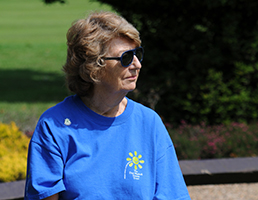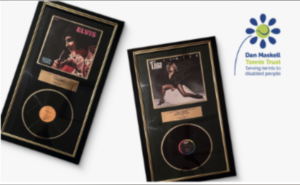
Dan was brought up in Fulham at the start of the 20th century with a very strict upbringing and little money to spare. His father was an enthusiastic cyclist, a relatively new pastime in the 1900s, and the family were all interested in outdoor activities. His older brothers regularly walked down to the recreation ground to ‘play’ football, their sweaters placed on the grass to mark out the goals. On one memorable occasion they wheeled baby Dan to the ground, putting the pram in the shade of a tree. The had an enjoyable and noisy game with other local lads and eventually went home tired but happy. Mother immediately asked “Where’s the baby?” My Uncle Bill, aged about 14, was horrified and confessed “We’ve left him in the park!”. He sped back and was mighty relieved to find young Dan still there and gurgling happily in the pram.
Living in Fulham, Dan was aware of Queen’s Club from a young age and soon became a ballboy. He thought this was a better way of earning money than queuing for meat or delivering bread. This was when his love affair with lawn tennis began and never faded. He loved being surrounded by interesting people from all walks of life, as the members ranged from lawyers and MPs to theatrical people, with everything in between.
Cutting a very long story short, he rose from ballboy to junior professional and at 18 to full professional. Eventually in 1928 he became the British Professional Champion for the first of 16 times. Asked to coach the nephews of Lord Charles Hope at Hopetoun House in Scotland, he watched their uncle practising his golf swing on the estate’s 9-hole course (he was a scratch player). Mentioning this after the tennis session he was advised to speak to the butler, who was a keen player. Guided by him Dan had a pretty poor first experience, but nevertheless became fascinated by the game, a pleasure which never left him. At home, as children, my brother and I were both amused or confused when Daddy regularly came home from playing golf at Wimbledon Common Golf club – where he was a member for 50 years – and would announce to Mummy, “I’ve found the secret!” or “I’ve lost the secret!”.
That same year, 1928, he was appointed the first professional coach at The All England Club to coach juniors with potential to become Davis or Whiteman Cup players. This was a happy time when he was treated very thoughtfully – the locker room steward gave him two lockers as he would be changing more often than the members (one belonging to a 90-year-old member).
When war was declared in 1939 Dan applied to join the RAF. During his long wait for a decision, the Club became an ARP Centre, where the car parks were used to grow crops and graze animals. Mummy used to prepare first aid kits and wind bandages with the other volunteers. At last it was decided that Pa would be appointed the first RAF Rehabilitation Officer and be based at the Palace Hotel, Torquay, Devon. This was an ideal location with covered tennis courts, a 9-hole golf course, swimming pool and gym. Mum again got involved starting a Milk Bar, which she thought would remind injured pilots and navigators of happier times visiting pubs and bars, whilst sitting on bar stools together. She also arranged revues and sing-songs, right up her street as she was a talented amateur actress with the Putney Players, where I found my own love of acting, just prompting or helping backstage.
Back in 1934/35/36 when we won the Davis Cup and Fred Perry had, of course, won the Wimbledon singles, he became a close friend. Later whenever he was in the UK during Wimbledon he would come over for supper and Mum would make his ‘favourite’ – fish and chips! This was not from a shop, in paper, but home-made. Whilst she was in the kitchen Fred and Dan would chip (hollow) practice golf balls into her nice arrangement of copper beech leaves that were on a window-sill in the living room – like a couple of naughty schoolboys!
After the war ‘Focus on Tennis’ was started by the CCPR. It went on the road for 3 weeks for the next 3 years, with Dan and Fred demonstrating in slow motion and then playing at speed, with dear Emlyn Jones (who played for Wales and became the first Director of the Crystal Palace Sports Centre) commentating for them. Play took place on rugby grounds, in drill halls, public parks and occasionally on tennis courts! 22,000 spectators over that time were accommodated in strange places – on football stands, school benches and even on fish boxes! A great friend of mine whom I met in 1965 in the Women’s Royal Naval Service, remembers them visiting a City of Norwich Secondary Modern School for boys. She and about 30 other girls from the Grammar School were taken over to see the local ‘Focus on Tennis’ session, which they apparently thoroughly enjoyed. {perhaps the boys made the visit more memorable!). Driving between venues Dan, Fred and Emlyn usually managed to get in a game of golf somewhere – great relaxation for them.
In 1949 the BBC asked Dan if he’d like to join Max Robertson in the radio commentary box to act as a summariser. He very much admired Max’s verbal dexterity, being able to describe every shot with his quick-fire ball-by-ball commentaries. Dan had actually done a short piece on TV in 1938, the second year of regular TV broadcasts, when he did a coaching feature for ‘Picture Page’, a regular programme. Asked about the props he needed, he suggested a practice board to hit off against, with a line (for the net) and a run-back of about 21ft to show that tennis is a game of fast movement. On the day of filming he was extremely surprised to find he would be working among the paraphernalia of a scene from Pickwick Papers! A mock bookcase was turned around to used as a practice board with no line and very little run-back. There were crosses on the floor – why? – apparently these were where he had to stand, otherwise the camera wouldn’t pick him up. With only 14ft he said, “it won’t be easy to convince viewers that tennis is a fast-moving game!”. It hadn’t occurred to the BBC to provide balls, but luckily he’d brought a box with him. He dropped a ball and knocked it against the back of the bookcase, which promptly tottered and almost fell over. In recalling this episode it occurred to him that, “This was probably the very first tennis that was ever broadcast. It was a pretty ordinary little item, but we all thought we’d achieved something rather special.”
After two years with Max Robertson in 1949 and 50, Peter Dimmock (Head of BBC Sport) suggested Dan should have a trial with Freddie Grisewood, ’the man with the golden voice’. He couldn’t have had a better mentor. Dan literally sat at his feet in a tiny commentary box situated slightly below the Royal Box, on the left. To get to it one had to climb an iron ladder and emerge through the concrete floor of the platform on which the box stood. Paul Fox of BBC Sport had had a nasty fall from the ladder breaking several ribs. Dan’s nose was almost on the desk to enable him to see through the window! A significant change came in 1951 when Freddie suggested he should have a crack at ball-by-ball commentary. He did well and when Freddie was asked to host a new series, ‘Any Questions’, he took over. He always seemed to have good fortune in his career, he was never unwell and never missed a days play during the 36 Championships held in his day. Again he loved the team work involved and had much admiration for the technical side:- the producer, editors, engineers and stage managers, all working in harmony (Mum would say, “rather like putting on a stage production”). I feel that having a pleasant voice and economy of words had a great deal to do with Dad’s success. Listening to commentators from other countries – the USA, perhaps – they sometimes seem to forget we the viewers can see the play and don’t appreciate constant chatter but do like to have really useful and interesting information. Henry Longhurst (golf) once said to Dad, “A seconds silence is worth a minutes talk”. How true but it is not easy to achieve a good balance. According to Pa one needed to have two golden rules, “ First, never talk during a rally, and second, always keep an eye on the monitor.” He felt a little cheated if a great performer suddenly did something brilliant or made a glaring mistake and the commentator didn’t enlighten him.
Behind every successful man is usually an intelligent and supportive woman! Constance, my mother, was certainly a queen of one in so many ways. We were supposed to have the TV on everyday during Wimbledon, unless Mum was actually there, when Dan did his ‘homework’ assiduously and listened to her comments, which he appreciated greatly. She regularly typed his articles for newspapers or magazines, checked the grammar and then delivered them by public transport to wherever they were needed in London. Fruit cake and lemon and honey juice were ready for him to take to Wimbledon – matches could last for 2-3 hours or longer, so these were essential. Washing and ironing kept her busy too, but at least it wasn’t white tennis gear anymore!
On match days he always collected the order of play for the next day before he left the Club (always one of the last!). He studied the form/results of the players he would almost certainly be talking about the next day and would try to remember anything particularly interesting about their background, behaviour and other interests. For example, Navratilova loved skiing, Federa was a family man, and so on, although he much preferred to talk about their tennis skills. This left John Barrett to say who was in the Royal Box, what the weather forecast was or if Cliff Richard, or anyone else of interest, was in the Member’s seats!
After the men’s singles championship had been won we often had a party in our garden from about 8 pm, whence guests left the club. I so well remember Roy Emerson playing the grand piano and Lew Hoad wandering into the kitchen where Mum was mixing more Pimms No 1. He helped himself, saying, “this is good” before she had a chance to say, “the lemonade hasn’t been added yet!”. Next day my brother came in with Niki our beloved black laborador, looking a bit green. He had picked up some cigarette ends and put the tobacco into this clay bubble pipe. As far as I know he never smoked again! Happy times.
Writing this has certainly reminded me of my fortunate upbringing, in a lovely characterful house and garden which we all adored, nice neighbours and friends of all ages. I regret not appreciating my father more at the time and I am really amazed at what he achieved from a lowly background, by sheer determination and hard work. It has been fascinating studying his autobiography again (ghosted by John B, of course) it was quite a life. He had integrity and loyalty all the way through. I’m so glad that his spent most of this life doing what he loved, lawn tennis and golf, and spreading the word that sport can offer a great career and the opening up of a new world – whoever your are and wherever you come from.
Robin Charlton
